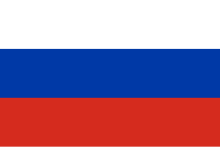Russia at the 2004 Summer Olympics
| Russia at the 2004 Summer Olympics |
|||||||||
|---|---|---|---|---|---|---|---|---|---|
 |
|||||||||
| IOC code | RUS | ||||||||
| NOC | Russian Olympic Committee | ||||||||
| Website |
www |
||||||||
| in Athens | |||||||||
| Competitors | 446 in 27 sports | ||||||||
| Flag bearer | Alexander Popov | ||||||||
|
Medals Ranked 3rd |
|
||||||||
| Summer Olympics appearances (overview) | |||||||||
| Other related appearances | |||||||||
|
|
|||||||||
| Qualified for the quarterfinals |
| Qualified for the semifinals | |
| Qualified for the quarterfinals |
| Qualified for the semifinals | |
| Qualified for the quarterfinals |
Russia competed at the 2004 Summer Olympics in Athens, Greece, from 13 to 29 August 2004. This was the nation's third consecutive appearance at the Summer Olympics as an independent nation. The Russian Olympic Committee sent a total of 446 athletes to the Games, 244 men and 202 women, to compete in all sports, except baseball, field hockey, football, and softball.
Russia left Athens with a total of 90 Olympic medals – 28 golds, 26 silver, and 36 bronze – finishing second only to the United States in the overall medal standings, and third in the gold medal tally. The Russian delegation proved particularly successful in several sports, winning a total of nineteen medals in athletics, ten each in shooting and wrestling, seven in gymnastics and weightlifting, six in boxing, and five in cycling and judo. From the twenty-four sports played by the athletes, twelve of them won more than a single Olympic medal. Russian athletes dominated in rhythmic gymnastics and synchronized swimming, where they each won gold medals in all sporting events. Russia's team-based athletes came powerful and successful in Athens, as the indoor volleyball teams, along with men's handball and water polo and women's basketball, claimed Olympic medals in their respective tournaments.
Among the nation's medalists were synchronized swimming pair Anastasia Davydova and Anastasiya Yermakova, who both won gold in the women's duet and team routines, pole vaulter Yelena Isinbayeva, who later emerged as Russia's most promising track stars in the decade, and Greco-Roman wrestler Khasan Baroyev, who sought revenge for Russia on Alexander Karelin's defeat from Sydney to take home the super heavyweight title. Five-time Olympian Andrey Lavrov helped the men's handball team beat the Hungarians on his quest for the bronze medal and fourth overall in his final Olympic appearance.
Originally, Russia recorded an overall tally of 92 medals at these Olympic Games. On 23 August 2004, the International Olympic Committee ordered a lifetime ban for shot putter Irina Korzhanenko, and thereby stripped off her gold medal after being tested positive for the steroid stanozolol. Eight years later, her teammate Svetlana Krivelyova had been ordered to hand back her bronze, as the drug re-testings of her samples were discovered positive. Meanwhile, on 10 August 2012, road cyclist Viatcheslav Ekimov had officially received the men's individual time trial title, following American rider Tyler Hamilton's disqualification for failing a blood doping test. Ekimov's third gold medal in cycling at these Games added his triumphs in the track team pursuit, when he played for the Soviet Union at the 1988 Summer Olympics in Seoul, and the men's road time trial in Sydney four years earlier.
...
Wikipedia
